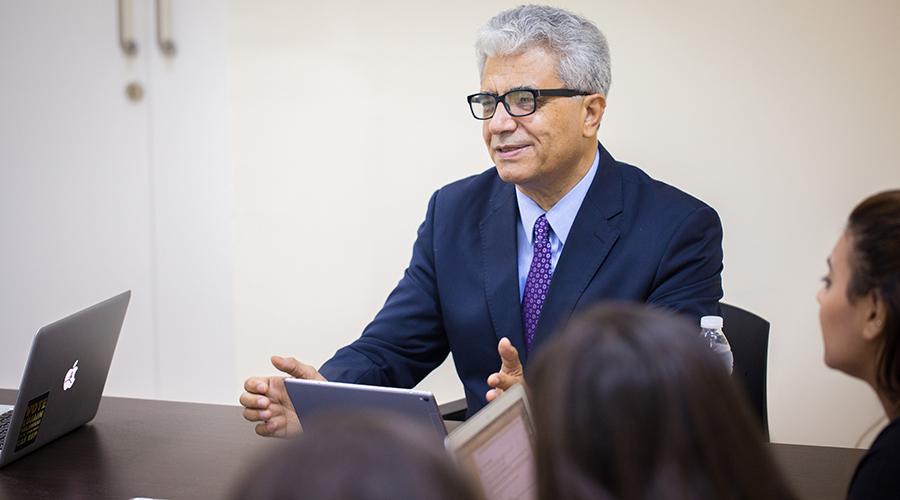- About
- Admissions
- Study at AUS
- Prospective Students
- Bachelor's Degrees
- Master's Degrees
- Doctoral Degrees
- Admission Publications
- International Students
- Contact Admissions
- Grants and Scholarships
- Sponsorship Liaison Services
- Testing Center
- New Student Guide
- File Completion
- New Student Orientation
- Payment Guide
- Executive Education
- Students with Disabilities
- Academics
- Life at AUS
- Research
- Contact Us
- Apply Now
- .

AUS professor discusses data analytics and ethical media standards at international communication conference
The significance of data analytics in public messaging and the ethical standards of communication practitioners were addressed recently by Dr. Mohammad Ayish, Professor and Head of the Department of Mass Communication at American University of Sharjah (AUS), at the International Government Communication Forum in Sharjah.
Regarded as integral components of the mass communication curriculum at AUS, data analytics and ethical standards featured prominently at the annual conference held September 26–27 2021—a first-of-its-kind regional platform bringing together global government communication experts to explore best practices in the field.
Dr. Ayish addressed young media practitioners and students in an online pre-conference session on the role data analytics play in social media and their significance in gauging users’ online engagement with public messages.
“Data analytics provides communication managers and practitioners with a solid foundation for making critical decisions relating to strategic planning, content creation and long-term networking with stakeholders. In the case of government communication departments, which is the focus of the forum, there is a need to build capacities and learn how to best harness the power of data analytics by establishing appropriate technological infrastructures and creating an organizational culture that values data-driven decisions and practices,” said Dr. Ayish.
He also discussed during the conference the ethical standards and professional competencies communication practitioners must possess in a complex technology-driven environment.
“Ethical standards range from fairness to institutional loyalty, diversity, tolerance and transparency. Professional competencies look at areas of academic qualification, digital storytelling, data analytics, research and strategic planning,” Dr. Ayish said.
Reflecting on the discussions held during the conference, Dr. Ayish noted that the mass communication program at AUS was designed to prepare new generations of young communicators to meet the challenges of a technology-driven and fast-changing media market.
“Our program emphasizes digital storytelling, visual content creation, data analytics, social media and multi-platforming within a long-standing liberal arts education tradition. Data analytics is becoming a key area of media education as emerging communications become increasingly defined by data-driven practices. This is why it has been integrated into a new course in mass communication research that prepares students for higher-level courses in social media strategies and integrated marketing communications campaigns. Media ethics is also a key component of our curriculum. All communication practices, whether in journalism or corporate sectors, are defined by ethical standards that students should engage with during their study years. We emphasize values of objectivity, fairness, freedom, equality, diversity, justice, tolerance, honesty and human dignity,” said Dr. Ayish.
The conference was also attended by several AUS mass communication students and faculty members.
He added that the participation of mass communication students at the conference and their engagement with media professionals supplemented their academic training with more real-world experiences.
“Students were able to meet speakers and engage in discussions relevant to their interests. One key aspect of our mass communication program is to engage students with the professional community by inviting industry professionals to the classroom, enabling our students to attend media events and, of course, completing a five-week internship at media sites,” he said.
Dr. Ayish added that it is also crucial for media educators to keep channels open with the community to exchange knowledge and expertise.
“The Department of Mass Communication at AUS is always keen on reaching out to appropriate stakeholders in the community and exploring potential collaborations. We have an advisory board comprising leading media professionals and we contribute to several media functions across the UAE. Of course, our ultimate goal is to graduate students who are multi-tasking and multi-functional across the range of journalistic and integrated marketing communications sectors with a passion for creativity and innovation. We are extremely proud to see our graduates taking up leading positions in top-notch international organizations such as CNN, Bloomberg, Ogilvy, Dubai TV, Sky News Arabia, The Guardian, the World Bank, Gulf News, United Nations, Arab News, The National, Google and many others.”
The Department of Mass Communication’s concentrations in journalism and integrated marketing communications seek to engage students with the latest media industry trends through both on-campus and field learning and training. For more information on the Bachelor of Arts in Mass Communication Program at AUS, please visit w.aus.edu/cas/bamc.

